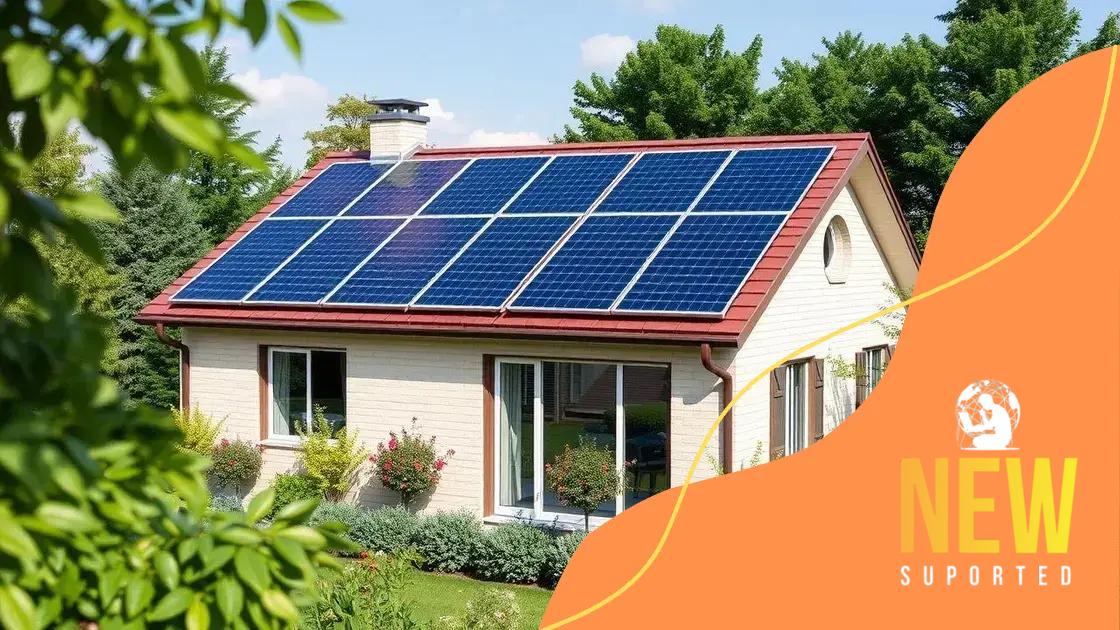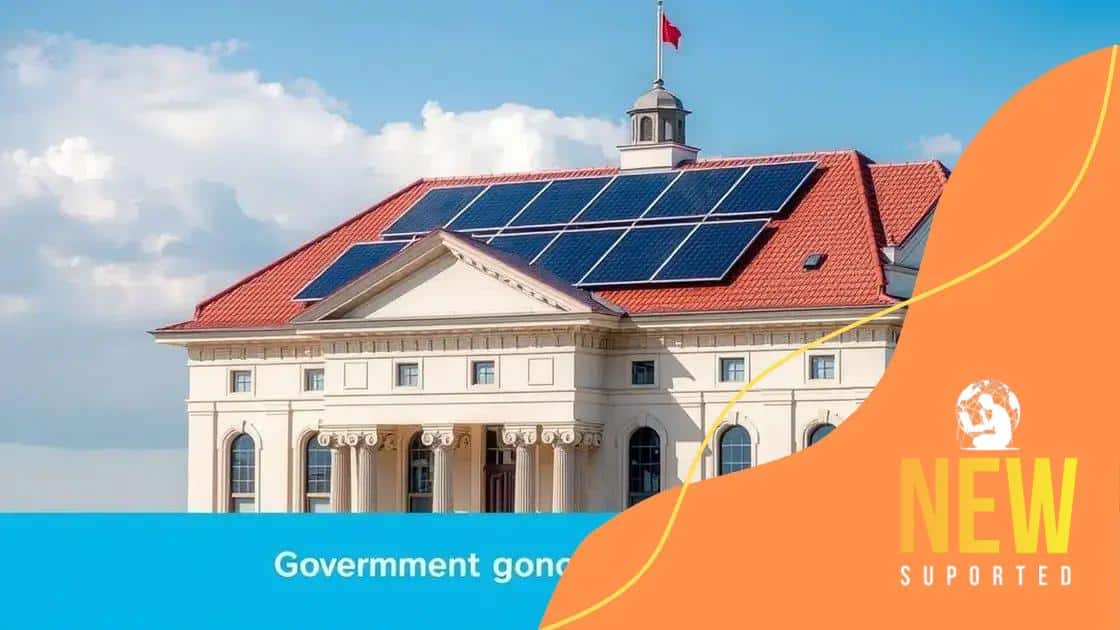Solar energy becoming more affordable worldwide

Solar energy is becoming more affordable worldwide, enabling households to save on energy bills, increase property value, and contribute to a sustainable environment through reduced greenhouse gas emissions.
Solar energy becoming more affordable worldwide is a topic that sparks interest as it influences our choices and future. Have you considered how this change impacts your energy bills and the environment? Let’s dive into the latest trends and benefits.
Understanding the decline in solar energy costs
Understanding the decline in solar energy costs is essential for grasping its growing popularity. In recent years, the price of solar technology has dropped significantly, making it accessible to more people. This decrease in costs has been driven by various factors, which we’ll explore.
Factors Driving Price Reductions
Several key elements contribute to the decreasing costs of solar energy. Advancements in technology have played a crucial role. As manufacturers develop more efficient solar panels, the overall production costs decline. This means that consumers can obtain solar energy at a lower price.
Economies of Scale
Economies of scale also assist in reducing prices. As more people invest in solar energy, production ramps up. Increased demand leads to greater efficiency in manufacturing processes, cutting down costs even further.
- Increased manufacturing efficiency
- Better technology integration
- Growing market competition
Additionally, government incentives help lower the financial burden. Tax credits and rebates for solar installations make it financially beneficial for homeowners and businesses to switch to sustainable energy. These incentives often cover a significant portion of installation costs.
The Role of Innovation
Innovation in battery storage technology is another game changer. Improved battery systems allow for better energy storage, meaning solar energy can be used even when the sun isn’t shining. This advancement reduces reliance on traditional power sources and makes solar energy more appealing.
- Enhanced energy management systems
- Reduction in battery costs
- Integration with smart home technologies
Moreover, as public awareness about climate change grows, many consumers are more inclined to invest in solar energy. They recognize the long-term savings and environmental benefits. The momentum for solar energy is building, and understanding its declining costs will help more people make informed decisions.
Factors contributing to affordable solar solutions
Several key factors contribute to making solar solutions more affordable for consumers. As technology evolves, the price of solar panels has decreased significantly. This trend has made it easier for households and businesses to adopt solar energy. Understanding these factors can help individuals make informed energy choices.
Advancements in Technology
Technology has made a big difference in solar affordability. Modern solar panels are more efficient and less costly to produce than earlier models. Manufacturers invest in research which leads to better product designs and lower prices.
Government Incentives
Government support plays a vital role. Many countries offer tax credits and rebates for solar installations, reducing the upfront costs. These financial incentives encourage more people to switch to solar energy.
- Federal and state tax benefits
- Grants for solar installation
- Subsidies for renewable energy projects
Moreover, as solar technology becomes more common, competition increases. More companies entering the market often lead to better prices and innovations. With increased competition, manufacturers strive to provide the best product at the lowest price, benefiting consumers.
Economies of Scale
The concept of economies of scale also helps to lower costs. As demand for solar products increases, companies can produce more units at a lower average cost. This reduction in costs can then be passed down to customers, making solar energy even more appealing.
- Lower production costs
- Improved supply chain efficiency
- Bulk purchasing discounts
In addition to these factors, the growing public awareness of climate change drives interest in sustainable solutions. As people recognize the value of clean energy, they are more likely to invest in solar technologies, further pushing down costs through increased demand.
Impact of government policies on solar energy

The impact of government policies on solar energy is significant and shapes the industry in many ways. Strong governmental support can enhance the availability and adoption of solar technology. For instance, policies that offer subsidies and tax credits encourage businesses and homeowners to invest in solar solutions.
Incentives and Rebates
Incentives play a crucial role in making solar energy more affordable. Many governments provide financial incentives that reduce the initial cost of solar installations. These programs make it easier for individuals to transition to renewable energy sources.
- Direct cash rebates for solar panel installation
- Sales tax exemptions on solar equipment
- Property tax incentives for solar installations
Furthermore, policies that promote solar energy create a more favorable environment for industry growth. When regulations support solar energy projects, it results in increased investment. This investment leads to innovation and competitive pricing.
Renewable Energy Standards
Another factor is the implementation of renewable energy standards. Many regions mandate that energy providers must obtain a certain percentage of their power from renewable sources. This pushes utilities to adopt solar energy solutions. When utility companies invest in solar energy, it enhances accessibility and further drives down costs.
- Mandatory renewable portfolio standards
- Clean electricity mandates
- Support for community solar projects
Moreover, public awareness and activism can influence government action. As more citizens advocate for clean energy, policymakers respond by creating supportive frameworks. These frameworks can include funding for solar research, improving technology and infrastructure.
In summary, government policies shape the solar energy landscape through incentives, regulations, and public support. By addressing these elements effectively, governments encourage the transition to a sustainable future.
Innovations driving solar technology improvements
Innovations in solar technology are crucial for improving efficiency and reducing costs. These advancements not only enhance the performance of solar panels but also make solar energy more accessible to all. As technology progresses, the future of solar power looks brighter.
High-Efficiency Solar Cells
One major innovation is the development of high-efficiency solar cells. New materials, such as perovskite, are being used to create solar cells that convert more sunlight into electricity. These cells promise higher efficiency at a lower production cost, making solar energy more attractive.
Solar Panel Design
Another area of innovation is the design of solar panels. Bifacial panels, which capture sunlight on both sides, increase energy output. This design allows them to harness reflected light, improving overall efficiency.
- Enhanced energy absorption
- More durable materials
- Lightweight designs for easier installation
Moreover, advancements in digital technology are transforming solar energy management. Smart inverters and monitoring systems provide real-time data, enabling users to optimize energy production. Thanks to these tools, homeowners can track their energy usage and identify ways to save.
Battery Storage Solutions
Battery storage solutions are a vital component of solar innovations. New battery technologies, such as lithium-ion and solid-state batteries, allow for better energy storage. These improvements enable users to save excess solar energy for later use, further enhancing the value of solar systems.
- Longer lifespan of batteries
- Faster charging times
- Higher energy density
Additionally, the integration of artificial intelligence in solar technology is paving the way for advancements. AI can optimize energy production by predicting sunlight exposure and adjusting operations for maximum efficiency. This integration not only improves performance but also lowers costs for consumers.
How households can benefit from solar energy
Households can benefit immensely from solar energy, making it a smart choice for many families. Utilizing solar power can lead to significant savings on electricity bills. As energy costs continue to rise, switching to solar provides an opportunity to lock in lower energy expenses.
Lower Energy Bills
One of the most immediate advantages is the reduction in monthly utility bills. By generating their own electricity, families can decrease their reliance on the grid. Homes with solar panels can often save 30% to 50% on their energy costs.
Increased Home Value
Installing solar panels can also increase the value of a home. Many buyers are willing to pay more for a property equipped with solar energy systems. This added value can make a significant difference when selling a home in the future.
- Attractive feature for prospective buyers
- Return on investment through increased property value
- Appeal to eco-conscious buyers
Moreover, solar energy systems can provide energy independence. Households become less vulnerable to rising electricity prices and power outages. Many families appreciate this stability and autonomy, knowing they can produce their own energy.
Environmental Benefits
Using solar power is a clean energy source, contributing positively to the environment. By reducing dependence on fossil fuels, households help decrease greenhouse gas emissions. This shift toward renewable energy makes a significant impact on the fight against climate change.
- Reduction of carbon footprint
- Support for sustainable energy development
- Participation in global efforts to combat climate change
Additionally, many governments offer financial incentives for homeowners to install solar panels. Tax credits, rebates, and grants can significantly lower the total cost of installation, making it easier for families to transition to solar energy.
FAQ – Frequently Asked Questions about Solar Energy for Households
What are the main benefits of installing solar panels at home?
The main benefits include reduced energy bills, increased home value, and lower environmental impact.
How much money can I save by switching to solar energy?
Many households save between 30% to 50% on their monthly energy costs by generating their own electricity.
Are there any financial incentives for adopting solar energy?
Yes, many governments offer tax credits, rebates, and grants to help lower the cost of solar panel installation.
What impact does solar energy have on the environment?
Solar energy significantly reduces greenhouse gas emissions, contributing to a cleaner and more sustainable environment.






